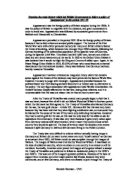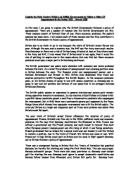To what extent did British public opinion deter British Governments from standing up to Hitler and Mussolini in the years 1933-37?
In the years 1933-37 both Germany and Italy became more aggressive in their foreign policy. Hitler, who came to power in Germany 1933, was set on destroying the Treaty of Versailles; this was clear from passages of his book ‘Mein Kampf’ and in October 1933 Germany withdrew from the Disarmament Conference and then from the League. Hitler then went on to announce the reintroduction of conscription in March 1935 and she soon had an army of 500,000 and an air force, both of which were forbidden by the Treaty of Versailles. Italy was also in a similar position; In October 1935 Italy invaded Abyssinia.
In this period we see Britain take up the policy of appeasement; maintaining the peace by making concessions to the aggressors. All of the British Governments at this time opted for appeasement. In their Manifestos at the General Election they all state the importance of the League and all comment that the League and the use of collective security should be used to deal with any future problems. British opinion had a large impact on the policies taken up by the British Governments, we can see from events such as the East Fulham by-election of October 1933 where a Conservative candidate who advocated an increase in defence spending was defeated by his Labour opponent, changing a Conservative majority of 14,621 to a Labour majority of 4,840, that the vast public opinion as against War, and other polls and ballots such as the Peace Ballot supports this. The British public were in opposition to another War due to the horrors of the First World War which had caused destruction, a huge loss of human life, and economic and financial debts that they were still currently paying. The First World War was seen as the ‘war to end all wars’ and had created a popular anti-war movement. There was also widespread faith among the British people in the League of Nations. They felt that the League through a policy of collective security would be better than allied forces and arm. Another reason for this anti-war feeling amongst the British people was the common feeling that the Treaty of Versailles imposed on Germany had been too harsh. Some had predicted the impact of the £6.6 billion reparations, they predicted that it would result in economic chaos in Germany, destabilise trade and lead to an extensive economic disturbance. When these predictions came true many felt that Versailles had been too hard on Germany and called for revision of the Treaty. People felt that certain restriction of the Versailles Treaty such as the prohibition to occupy the Rhineland in the next 25 years were expected to be broken by Germany and so Germany’s reoccupation of the Rhineland was felt by many to be like Germany walking into its own ‘backyard’.







